- We have developed COVID-19 monitoring dashboards that visualize locally relevant information to the public and policy makers. These dashboards are the official dashboards used by policy makers in Botswana, Nigeria, Eswatini, Mozambique, Namibia, Zimbabwe, and South Africa. The websites is viewed by more than 20k people daily
- We have been informing COVID-19 policies and COVID-19 vaccine roll-out strategies. Our team leaders have been using our findings to inform COVID policies and COVID-19 vaccine roll-out strategies in the different countries of impact (Botswana, Cameroon, Eswatini, Mozambique, Namibia, Nigeria, Rwanda, South Africa, Zimbabwe) as well as support communication strategies with local stakeholders that address dis- and mis-information about COVID-19 vaccines, COVID-19 prevention and treatment. Most of these leaders are heads of the COVID-19 modelling task force and COVID-19 advisory boards in their countries.. Below is a summary of what we have achieved in South Africa. The achievements in the other countries are similar to that in South Africa.
Our Achievements in South Africa
Our South Africa team leader Prof Bruce Mellado was appointed by the Premier of Gauteng to the Gauteng COVID-19 Advisory Committee, where he leads modelling and predictive efforts. He works with an interdisciplinary team of clinicians, practitioners, physicists and mathematicians to solve modelling problems of such a complex system as the COVID-19 pandemic. Our models are the official models used by Gauteng Premier in his interactions with both local and national policy-makers. The Gauteng Province is the most populous province of South Africa with over 15.5 million inhabitants and hosts Johannesburg and Pretoria, the economic hub of the country.
Our work in South Africa has been covered on all main TV, Radio and newspapers of South Africa hundreds of times. A selection of news bits can be found here . The South Africa team is regularly invited by the office of the Premier to participate in the press conferences given to the population to raise awareness of where we are in the pandemic and what measures need to be emphasized at any given time. The team has given over 60 presentations in the past 10 months to different work streams in the Gauteng Government, the War Room and the Provincial Command Centre chaired by the Premier of the Province, Hon. D. Makhura. Most of these presentations are given during closed doors sessions and cannot be shared here.
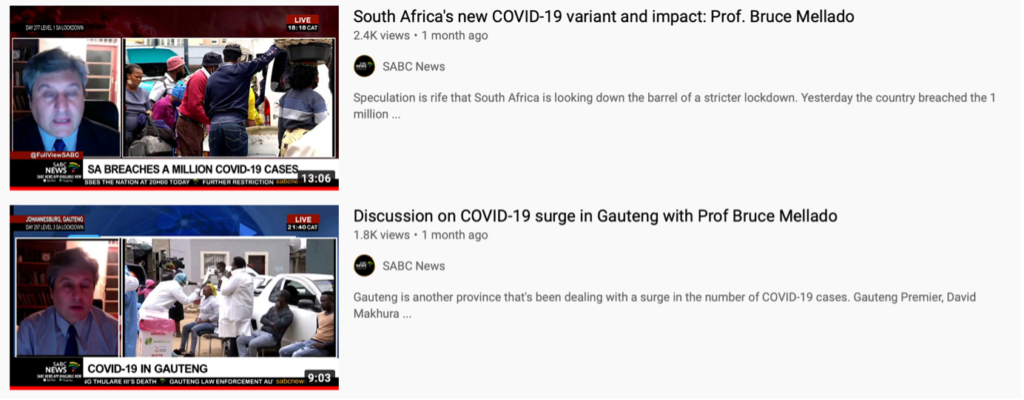
- Our COVID-19 Dual-SIRD model (the model we are using to forecast COVID-19 cases in South Africa: This model has been the basis for predicting the pandemic in the Gauteng Province-in South Africa. In particular, this model was used to perform the gap analysis. This is defined as the number of beds that the province needs in case of a peak. This analysis has been critical to make preparations for the peaks of the two waves and has ensured that the health-care system not be overwhelmed. This modelling has been showcased to the public and the press many times over the past year. A selection of TV, radio interviews and newspapers is available here. The Figure below shows the predictions from our model as displayed in one of the press conferences covered by TV and radio stations, chaired by the Premier and presented by our South Africa team leader. The article that details this model has been viewed over 2500 times and downloaded almost 1300 times and can be downloaded from here
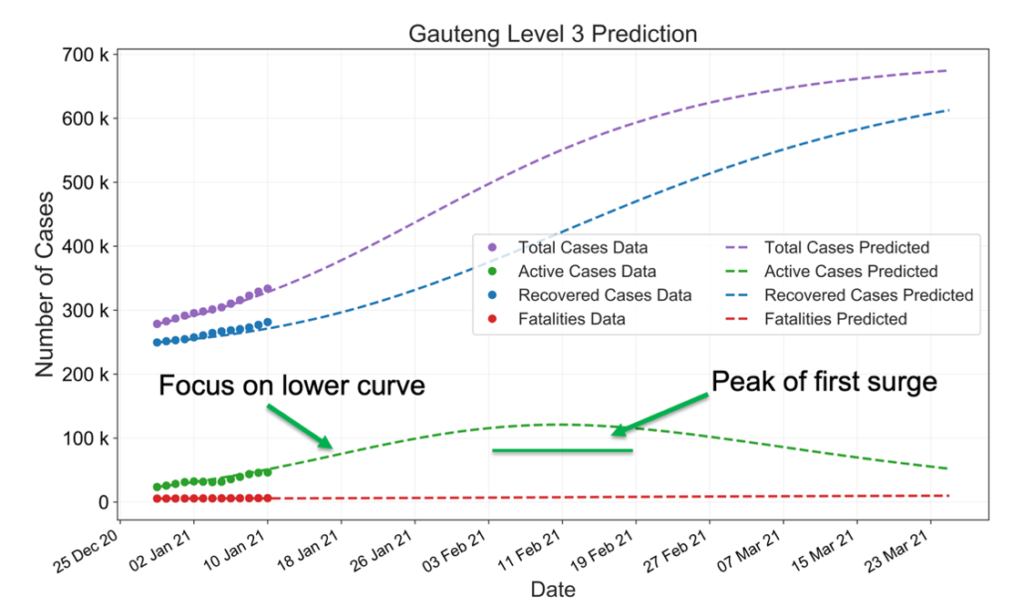
- Hot-Spot Analysis of COVID-19 in Gauteng, South Africa. The modelling of host-spots, which also provides an index of severity, has and continues to assist policy-makers at different levels and the population to identify COVID-19 hotspots within the province. The hot-spots can be visualized here. The preprint of the description of the model can be obtained from this link
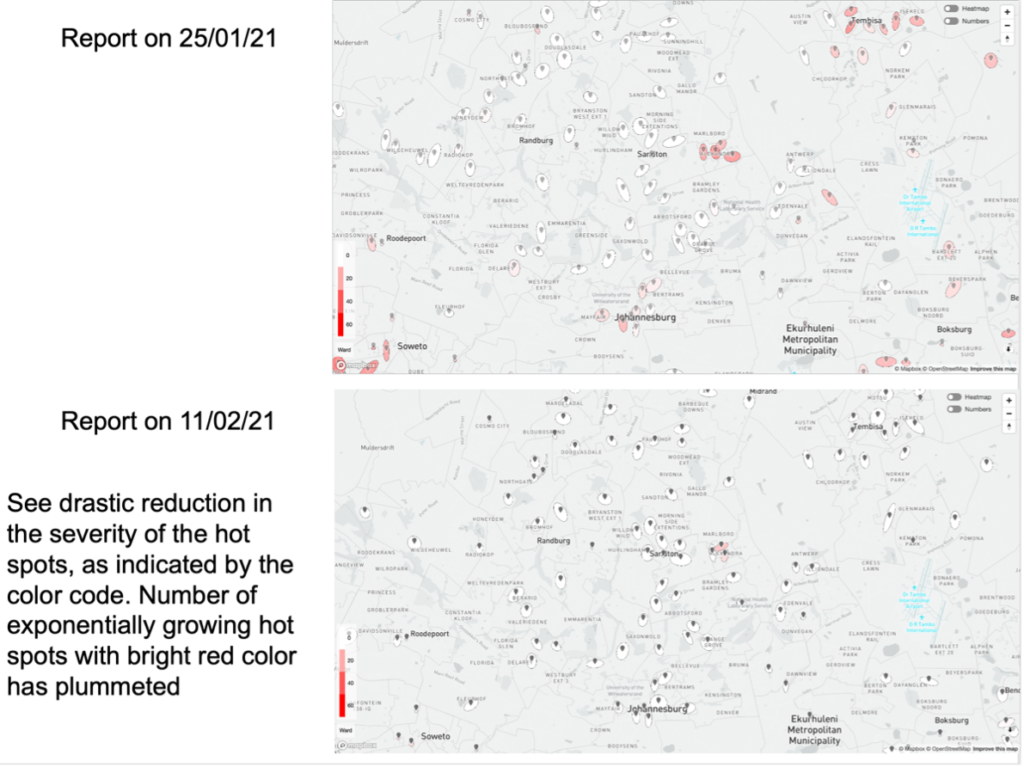
- Developing risk index of waves and resurgences in South Africa. Upon the request of the South African National Defence Force and the office of the Gauteng’s Premier, the team developed a risk index that quantifies the probability of a wave to occur given the available data. This index is the result of the statistical analysis of large amounts of international and national data and de facto provides an early detection algorithm for a wave or a resurgence to happen. This index is maintained on a daily basis and is used by policy-makers regularly
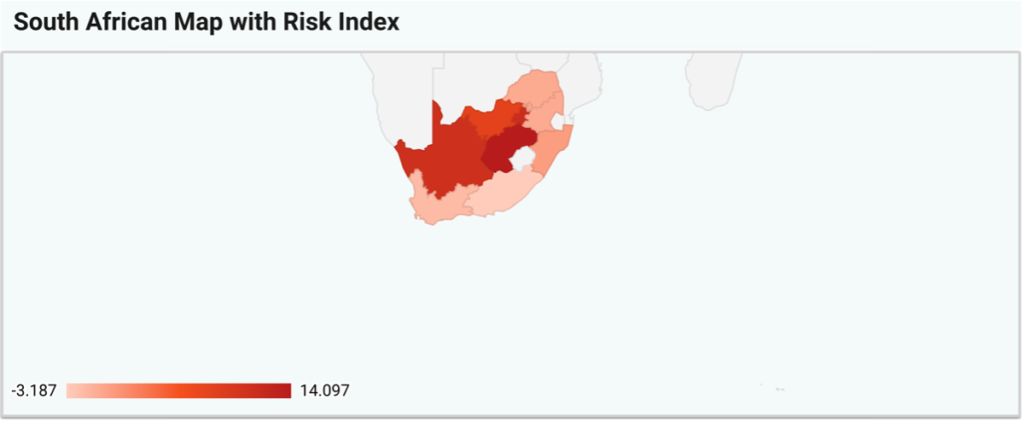
- Optimizing COVID-19 clinical public health and vaccination roll-out strategies in Africa. In order to identify and prioritize target groups who can benefit most from vaccination, in the Gauteng Province pilot study, multi-dimensional data have been provided by the Gauteng Department of Health (GDOH) and are being used to characterize variables associated with severe illness. Fourteen dimensions of individual-specific characteristics have been modelled and include: age; eleven relevant co-morbidities; gender and ethnicity; information pertaining to the type of hospitalization (General Ward, ICU, High Care and Isolation) and whether the subject was discharged alive or died in care is also provided. This allows for implementation of a supervised machine-learning classification procedure. A Deep Neural Network (DNN) has been trained to separate two classes of data sets: severe illness (ICU, High Care and Mortality) and less severe illness (subject discharged from the General Ward). The corresponding DNN weights have been applied to the population data provided by the Gauteng City-Region Observatory. A preprint of the model can be obtained from here . Our roll-out strategy has been adopted by the Gauteng province Premier’s COVID-19 Advisory Committee and the corresponding workstreams that are planning the roll out of the vaccine in the province, as indicated by the Chairperson (see below a graph from presented by the Chairperson that uses a graph from our preprint):
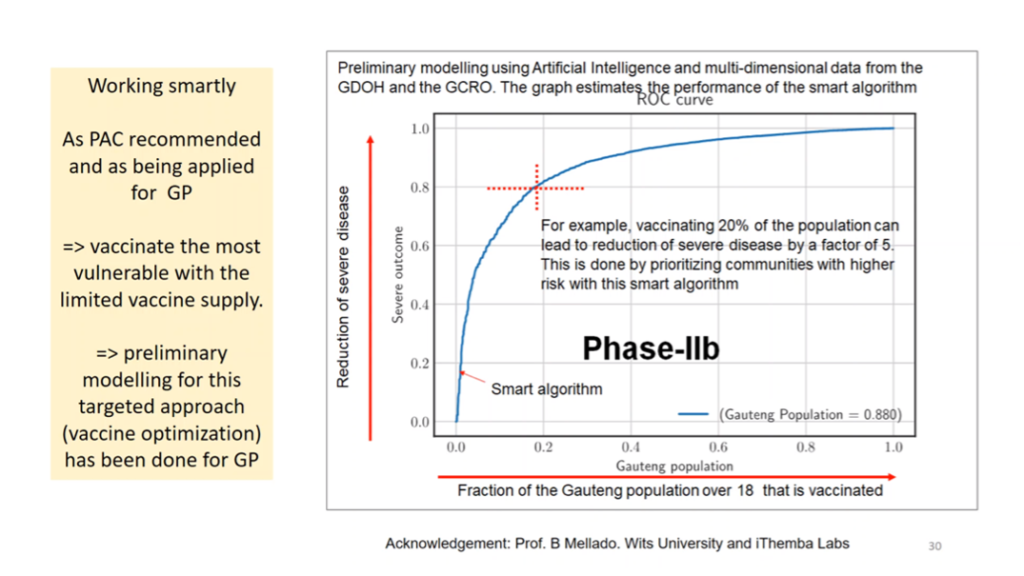
For a public presentation in support of recommendations that emerge from the team’s research see this link. This presentation was given by Mduduzi Mbada, the Head of Policy of the Gauteng office of the Premier.
- Adressing dis- and mis-information abSupport communication strategies with local stakeholders that address dis- and mis-information about COVID-19 prevention and treatment. Our team members give press conferences on our findings every week.


